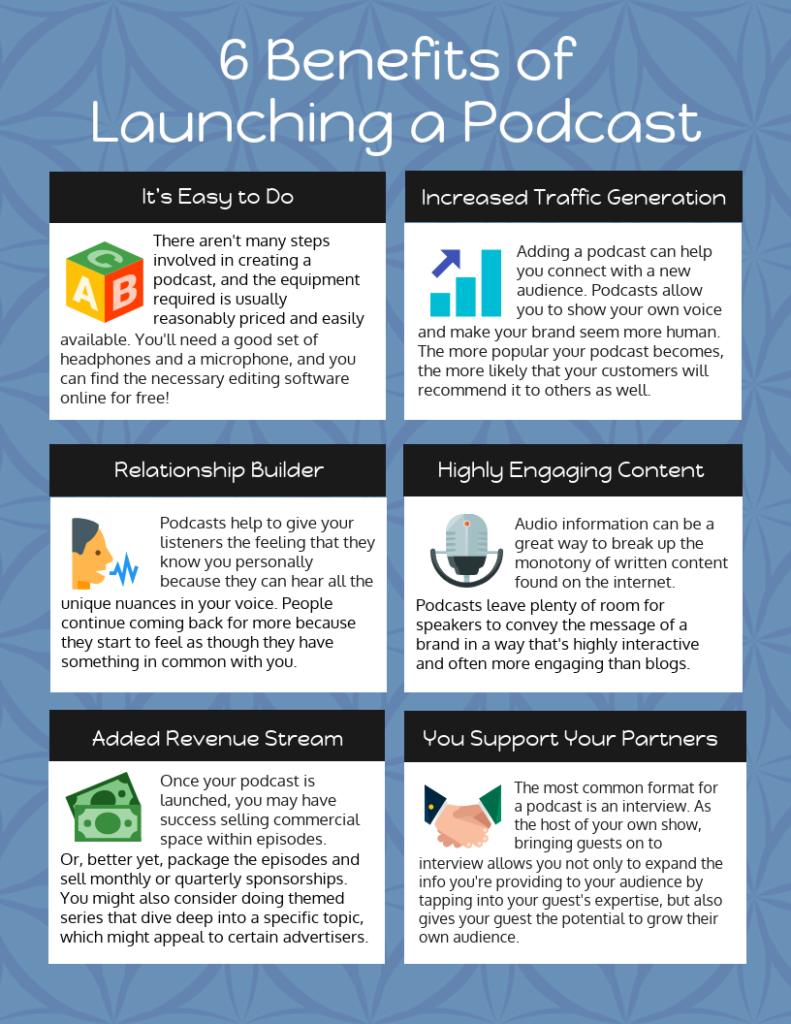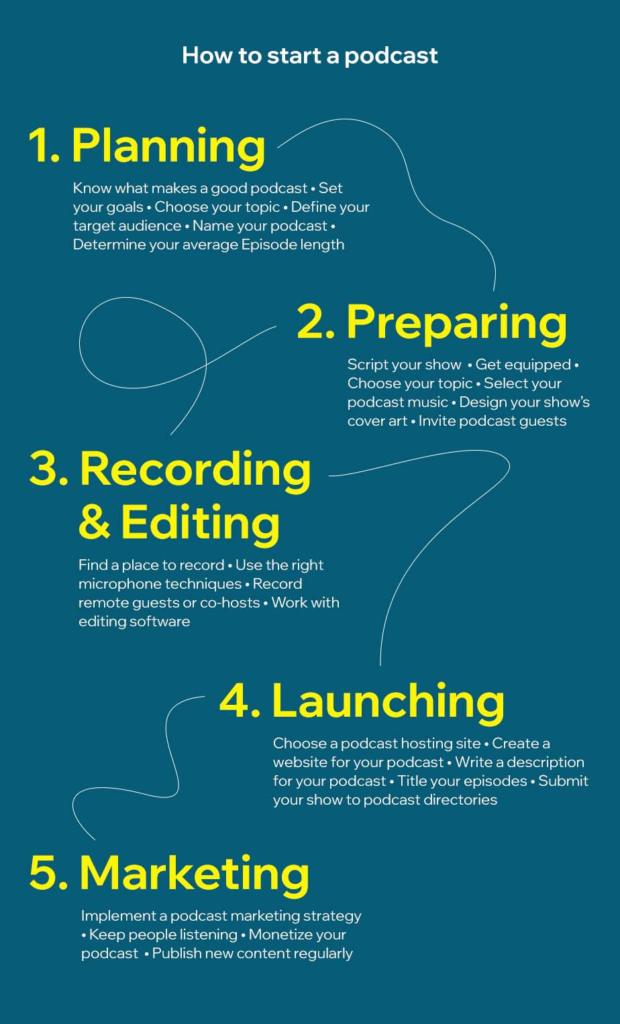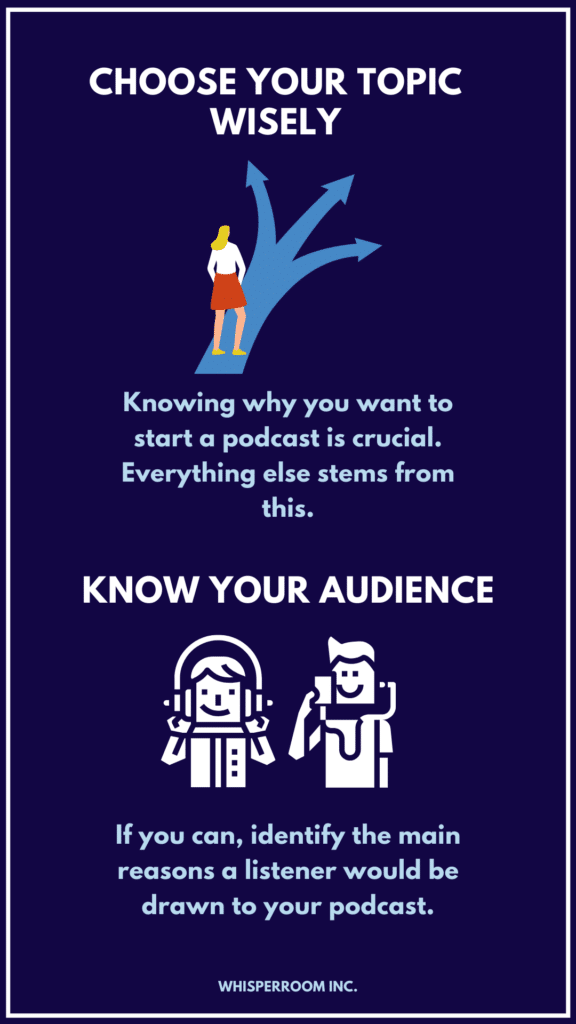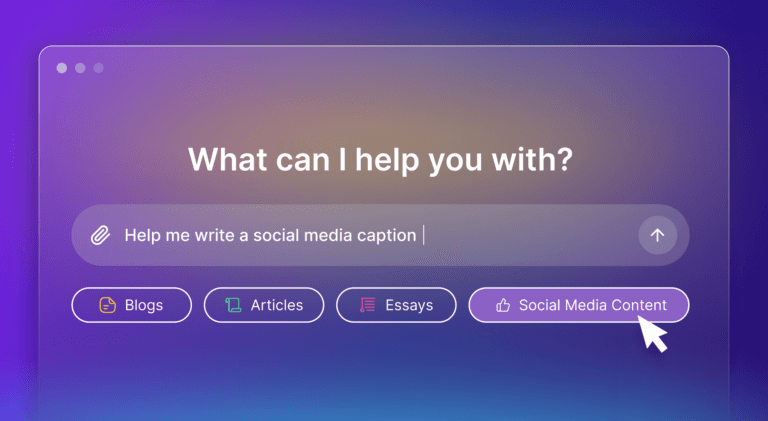
Table of Contents
- What Is a Podcast?
- Why Are Podcasts Important?
- 9 Tips to Create a Hot-Selling Podcast
- Key Takeaways
- Conclusion
- FAQs
Do you want to know how to start a podcast, but don’t know where to begin? If you’re reading this, you should have a straightforward plan for launching your podcast right now, not later (which never happens!)
Podcasts are great for building and sharing your expertise, interacting with your audience, and even generating additional revenue when monetized. But there are a few crucial things to find out before you jump in and start recording your program. For example, what are your show’s objectives? What do you need to start a podcast? Who is your ideal audience, and how will you approach them?
So, how to start a podcast successfully from the ground up? In this blog, we’ll guide you through every step of how to start a podcast and the things to know before starting a podcast.

The blog will give you a detailed understanding of how podcasts function, the equipment needed, audience identification, distribution, publishing, and growth, among many more factors. By the end of it, you’ll know exactly how to start a podcast and, perhaps, will be inspired to get started right away. Let’s take your message to your target audience!

What Is a Podcast?
A podcast is an audio series that may be downloaded and listened to on a personal device at any time. Each episode usually lasts 20 to 60 minutes and focuses on a single theme or topic.
Consider a podcast the audio version of a television show. It follows the same production style as other shows: it has a particular theme or topic, it’s episodic, can last multiple seasons, and can be based on fact or fiction.
The use of a podcast host distinguishes podcasts from television shows. Every podcast requires a presenter who can tell the tale and lead the audience in each episode. Furthermore, podcasts are only available in audio format.
You may integrate your podcast with popular podcasting apps like Apple Podcasts, Spotify, and Google Podcasts, to make it easy for millions of people to listen to and subscribe to your content.

Now that you know what a podcast is and how it works, let’s look at what purpose it serves.
Why Are Podcasts Important?
As we approach Season 3 of the epidemic, the world keeps becoming unpredictable. But do you know what will always be there for you? That’s right: podcasts! Whether you need to get through a particularly tedious journey, need the inspiration to go on one of those mental health walks we’ve all heard about, or simply want to turn off your brain and listen to someone else speak for a bit, podcasts have you covered.
It takes dedication and passion for creating a successful podcast. You can get through the usual lulls and setbacks with the correct drive. Here are some reasons why you should start a podcast.
- You’re looking for an enjoyable pastime.
- You’re always looking for new and fascinating projects to work on.
- You want to monetize your podcast.
- You want to grow a following and interact with your audience.
- You want to improve your brand and establish yourself as a thought leader in your sector.
- You have a strong interest in a topic and want to learn more about it.
- You have a message or a story you’d like to share with the world.
- You want to build a community of dedicated listeners.
It’s crucial to figure out what motivates you. Write it down to remain motivated throughout the process.
9 Tips to Create a Hot-Selling Podcast
Your search for tips on how to start a podcast ends here. What do you need to start a podcast? This blog answers this and many other questions.
1. Choose a topic you are absolutely sure of
Podcasts can become quite popular, and plenty of them are available on various themes. To succeed, you must identify your specialty and choose the things you will discuss in your podcast.

Begin by considering the sort of program you want to produce. It should be something you’re enthusiastic about learning and discussing daily. There are podcasts on almost any subject, so try to figure out what your area of expertise is.
Here are some questions you can ask yourself.
- Is this anything that has already been discussed on another podcast?
- If yes, how can you use it to create something unique and engaging?
- Is this concept contemporary and relevant?
- Is the audience interested in it?
- Is there enough material for a season?
Last but not least, you should choose a topic you are curious about, so that you may work for a long time without being bored or burnt out.
2. Pick a memorable name
When choosing a podcast name, go for something memorable and catchy that will rank for the important keywords in your podcast. Here are some things to think about when choosing a title for your podcast.
- Choose a name that accurately describes your material.
- Keep your podcast’s title short and sweet.
- Never use inventive misspellings, special characters, punctuation marks, or abbreviations in your podcast title.
- Make sure the title is easy to understand and spell.
Most importantly, before creating social accounts with the same name, double-check whether the name is accessible.
3. Create a stunning description for your podcast
Metadata is a description of a podcast episode. The name of your program, its description, episode number, release year, and other metadata are all included in your MP3 file. Filling out these sections will help your show appear on Apple, Google Play, and Spotify, as well as the other places podcast listeners look for shows in your category.
It’s crucial to have a compelling episode description if you want to succeed. It’s the paragraph in which you describe what your program is about. Make sure you inform readers what they’ll get out of it, and make it engaging, so they’ll want to subscribe.
4. Select a viable format
The beauty of podcasts is that they can take on almost any form. The format you pick is customized and is determined by the number of people involved. You’re not going to do a co-hosted program anytime soon if it’s just you. Some formats are conversational and interview-based, with one or many hosts bringing on guests, while others focus on the narrative (fictional and non-fiction).
The point is, although it’s nice to have an average structure, so your listeners know what to anticipate, you don’t have to keep to it every time. You could prefer a “mixed bag” approach if you’re comfortable with a specific structure and have settled into a routine. It’s entirely up to you to choose whatever format best suits your theme.
Begin by conceptualizing your episode parts, which divide your program into chunks to make it simpler to follow for listeners. Segments aren’t usually appropriately labeled. Acts one, two, and three are sometimes all that is required. It’s all about figuring out how to deliver the tale in a way that grabs and holds the audience’s attention.
5. Create the music for your podcast
While great episode content should always focus on your show, potential listeners will first notice your podcast cover art on platforms like Apple Podcasts or social media.
By looking at your artwork, potential listeners should figure out what your program is about. You’ll probably want to obtain some opening music if you decide to have an introduction. Check for royalty-free music when you’re looking for music to use in your podcast; otherwise, you’ll have to pay for the music for your content.
While royalty-free music is excellent, other podcasters may use the same tune you do since it’s free. Don’t worry about that; most listeners won’t notice. You may, however, purchase a track for your intro if you want more distinctive music.
If you decide to buy a track, we propose checking out AudioJungle and Storyblocks, as they have extensive libraries of tracks and sound effects. You’ll be ready to edit your first episode after deciding on your podcast opening and episode music.
6. Organize and test your software
So what do you need to start a podcast? All you require are the following high-quality items.
- Microphone
While you may be tempted to utilize the built-in microphone on your computer or phone, an XLR or USB mic will provide better sound quality. A dynamic mic that’s less susceptible to surrounding noise can be a good choice. A condenser mic may be preferable if you have a studio setup and if you’re just getting started.
- Studio or soundproof area
When recording a podcast, ambient noise should be kept to a minimum. As a result, it’s imperative to record in a calm, soundproof environment.
- Editing software
After you’ve recorded your episode, you’ll need to edit it to add music and commercials, as well as eliminate any extraneous material that doesn’t fit. You may use audio editing tools such as Audacity, Adobe Audition, and Descript, which all have different editing options.
- Noise-canceling headphones
These headphones are essential while recording as well as post-production. They allow you to monitor and detect noise.
- Hosting platform
Before you can distribute your episodes, you must first submit them to a hosting site. For this, you must buy a subscription. Podbean, BuzzSprout, and Blubrry Podcasting are a few hosting services to choose from.
7. Choose a hosting service that suits your needs
The next step is to choose a reliable media hosting service. You’ll need a podcast hosting account, also known as a “media host,” to get your podcast out there for everyone to listen to. Media or podcasting hosts store your audio and let your audience listen to, download, and subscribe to your podcast.
Podcasts require a home on the internet. Several podcast hosting systems store and broadcast podcast episodes, which listeners may subscribe to and listen to.
8. Record your first episode
It’s time to record your first episode, now that you’ve figured out all of the editing specifics of your podcast. You may be able to “wing it” depending on the topic of your podcast, but for the most part, some planning is essential.
Most individuals find having a rough overview of what they want to talk about or a list of questions to ask the interviewee useful. You may record your podcast using QuickTime Player, Audacity, or other simple tools once you’re ready. Ascertain that your microphone is connected and that you are in a peaceful environment, free of distractions.
Audacity is a free, cross-platform, open-source program that allows you to record professional podcasts at studio quality. After installing Audacity, click on “File” and select “New Project” from the file menu. Simply press the record button to capture your voice.
Now you may start recording your podcast. Don’t worry about uncomfortable pausing, interruptions, coughs, or any other narration errors.
9. Share it far and wide
Your podcast is technically operational at this point, and you have a backlog of episodes to release over the next few months. But when should you share it with the rest of the world? Depending on whether you currently have a following, you may want to undertake a pre-launch, informing your followers on social media or via email that a podcast is in progress.
This will pique their interest in the upcoming launch. If you don’t already have a following, you should put out at least three to five episodes so when someone listens to it, they have a decent notion of what it’s about.
Key Takeaways
- Podcasts are great for building and sharing your expertise, interacting with your audience, and even generating additional revenue when monetized.
- A podcast is an audio series that may be downloaded and listened to on a personal device at any time. Each episode usually lasts 20 to 60 minutes and focuses on a single theme or topic.
- Whether you need to get through a particularly tedious journey, need the inspiration to go on one of those mental health walks we’ve all heard about, or simply want to turn off your brain and listen to someone else speak for a bit, a podcast is a way out!
- When choosing a podcast name, go for something memorable and catchy that will rank for the important keywords in your podcast.
- It’s crucial to have a decent episode description if you want to succeed. It’s the paragraph in which you describe what your program is about.
- By looking at your artwork, potential listeners should be able to figure out what your program is about.
- What do you need to start a podcast? Podcasts require a home on the internet. Several podcast hosting apps, such as Apple, Spotify, and Google Podcasts, store and broadcast podcast episodes, which listeners may subscribe to and listen to.
- It takes more than a fantastic debut to make your podcast program a success. You must keep the momentum going through marketing.
Conclusion
Now that you’ve reached the end of this blog, we hope you know exactly how to start a podcast and what you need to start one. The next step is to establish a plan to start a show and invest in podcast equipment. This way, you can have a great starting point for your new show and can begin earning money through it soon.
We hope you found this blog helpful. We congratulate you on your upcoming show and wish you the best of success. Good luck with your podcasting!
FAQs
While you may start a podcast with nothing (as long as you have basic recording equipment), getting started will almost certainly cost you at least $100. And the actual cost depends on whether you expect to generate money from your podcast as a hobby or business.
Some of the things to know before starting a podcast in 2022 are as follows.
Choose a name that accurately describes your material.
Choose a format that best suits your theme.
By looking at your artwork, potential listeners should figure out what your show is about.
Choose a reliable media hosting service.
Here is what you need to start a podcast:
A soundproof recording environment
Desktop or laptop
Microphone
Podcast camera is optional.
Headphones with noise cancellation
Software for recording podcasts
You cannot start a podcast on Spotify directly. You will need to first upload it to a hosting service, which will then distribute your podcast to Spotify and other platforms (if you so desire). Some hosting services include Podbean, BuzzSprout, and Blubrry Podcasting. Once you’ve carried out the above step, you will be able to add your show to Spotify for free.
Indeed, you can start a podcast with your smartphone. But we would suggest using professional recording equipment.
Yes! You can start a podcast with no guests. Some of the most popular podcasts consist of a single individual.
Latest Blogs
Learn how to rank on AI search engines like ChatGPT, Perplexity, and Gemini by optimizing your content for authority, structure, and relevance. Stay ahead in AI-driven search with this strategic guide.
Explore the best healthcare SEO services for your medical practice. Improve online visibility and effectively reach more patients in need of your services.
Discover top social media agencies specializing in banking solutions, enhancing financial services and driving engagement.
Get your hands on the latest news!
Similar Posts

B2C Marketing
5 mins read
Top Choices for Best Content Marketing Services in B2B Industries

Artificial Intelligence
5 mins read
How A Lead Generation Specialist Can Use AI-Powered Content Funnels to Drive Conversions

Artificial Intelligence
4 mins read